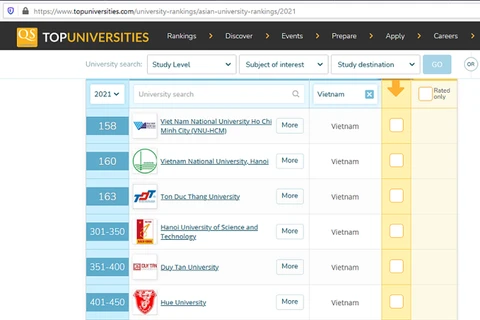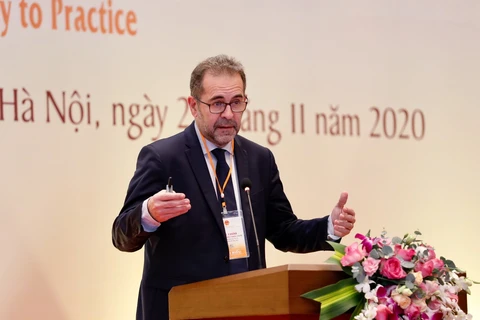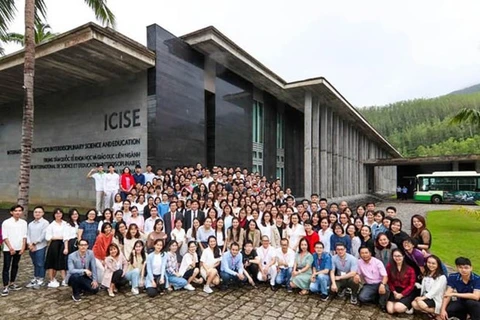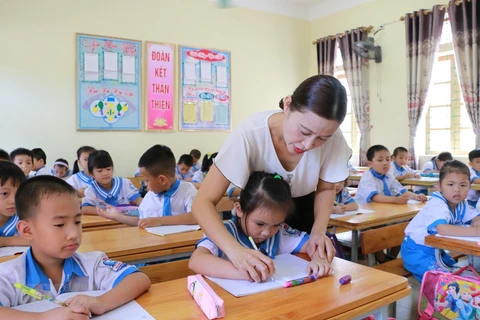 Assoc. Prof. Dr. Mai Van Trinh, Director of the Ministry of Education and Training’s Quality Control Department. (Photo: VietnamPlus)
Assoc. Prof. Dr. Mai Van Trinh, Director of the Ministry of Education and Training’s Quality Control Department. (Photo: VietnamPlus)
Hanoi (VNA) – Assoc. Prof. Dr. Mai Van Trinh, Director of the Ministry of Education and Training’s Quality Control Department, highlighted how it is important for Vietnam to participate in education assessment programmes after the country achieved high results in the 2019 Southeast Asia Primary Learning Metrics (SEA-PLM) report.
“One of the major goals when Vietnam participates in regional and international extensive education assessment programmes is to provide the country with a panorama of its education, primary education in this case, from which related policies can be developed properly,” Trinh told the Vietnam News Agency.
From the findings of the SEA-PLM and other reports, he suggested Vietnam focus on amending policies facilitating investment in educational infrastructure, equipment and teaching staff, particularly in remote and disadvantaged areas, to gradually bridge the gap between mountainous, rural and urban regions.”
“We should have awareness-raising programmes for parents to enhance the effectiveness of family education,” he said, adding that family involvement is very important to primary education.
He also urged greater attention to gender equality in education, and more training courses for principals of primary schools to help them sharpen management skills and strengthen each school’s self-control and activeness, especially at the time the country is pursuing new curriculum.
Finally, he suggested the country continue to join such programmes in the future to improve schools’ assessments for the most accurate and objective educational data.
Vietnam ranked first among Southeast Asian countries in terms of primary school student learning outcomes, according to the SEA-PLM 2019 Main Regional Report, developed by the Southeast Asian Ministers of Education Organization (SEAMEO) and the United Nations Children's Fund (UNICEF).
Among the six participating countries, namely Vietnam, Laos, Cambodia, Malaysia, Myanmar and the Philippines, primary school students in Vietnam ranked first in all three competencies surveyed, particularly Reading, Writing, and Mathematics.
In Reading, Vietnamese students showed the highest average competency level of 6/6. The percentage of Vietnamese students achieving the sixth level of competency is 82 percent. Malaysia ranked second with 58 percent of students achieving the sixth level. The percentages of the remainder were all below 10 percent.
In terms of Writing, Vietnamese students had an average capacity of 6 out of 8. Twenty percent of them qualified for Band 8. According to the report, these children may be able to transition well through to secondary education, and should be on the right track to meet the challenges of a 21st-century skills-based curriculum. This rate in the remaining countries was 2 – 4 percent.
In Mathematics, Vietnamese students had an average competency level of 8 out of 9. The percentage of children with the highest level of competency (level 9) was 42 percent. The rates among the remainder were all below 10 percent.
The learning gap between urban and rural students, as assessed by SEA-PLM, has narrowed, with almost no difference remaining. However, students in mountainous and remote areas are still lagging far behind students from other regions.
There are no differences between the learning outcomes of Vietnamese girls and boys in the Reading and Mathematics domains. However, girls are more likely to perform better than boys in Writing.
The report also found that higher levels of parental engagement were associated with higher reading, writing and mathematics scores in children. Half of the children reported that their parents motivate them to succeed in school (47 percent). Around one-third reported that their parents asked them about what they are learning in school (34 percent).
Launched in 2011, the SEA-PLM aims to assist SEAMEO member countries to better measure and understand the learning situation of primary students according to both general and individual criteria, thereby helping countries improve the quality of their education system.
The 2019 report assessed learning outcomes of fifth-grade students in six Southeast Asian countries to inform policy-making and ensure that all children achieve meaningful learning. It surveyed children’s proficiency in reading, writing and mathematics using the SEA-PLM - a regional large-scale student learning assessment program that aims to generate reliable data and evidence for monitoring learning outcomes across and within countries.
The programme collected the responses of children and schools through paper-pencil tests and questionnaires.
In Vietnam, data collection surveys were done in 150 schools with 832 teachers, 4,837 students and 4,160 parents involved./.























